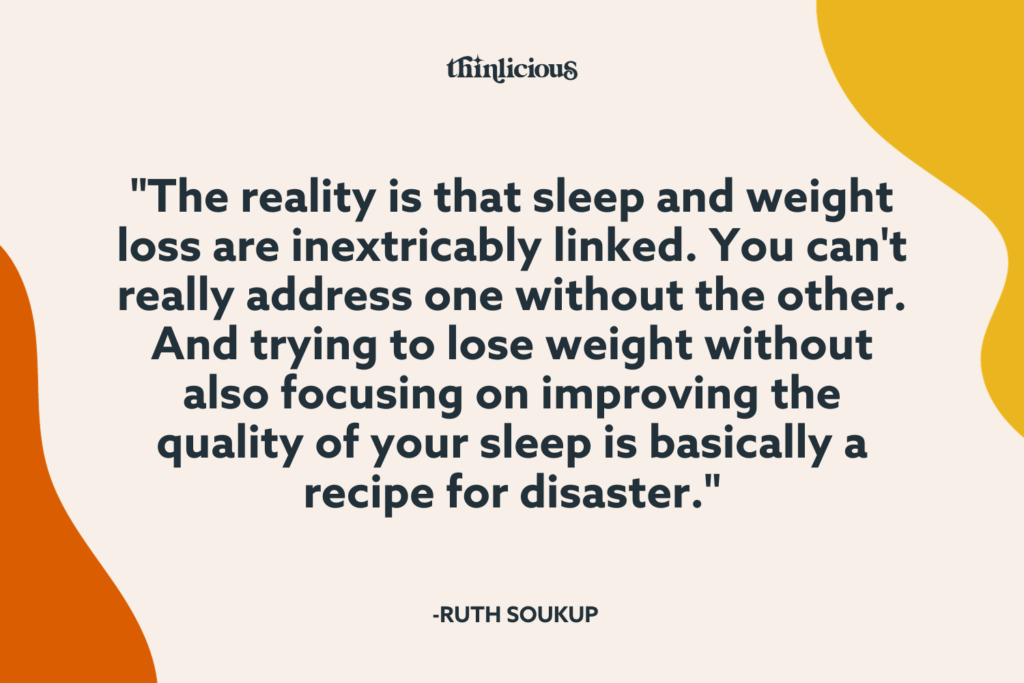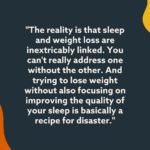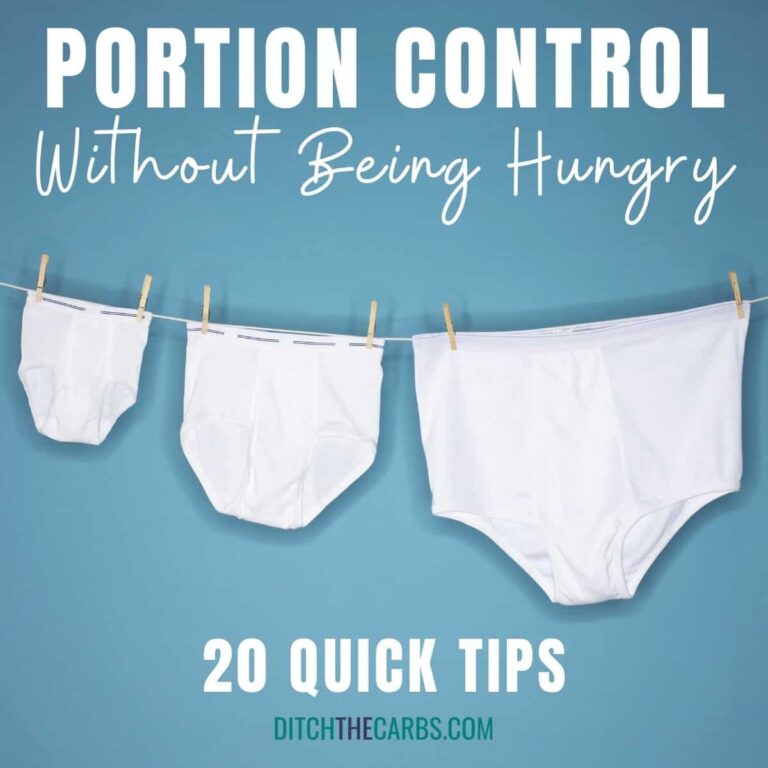Ever feel like you’re just tired ALL THE TIME? You spend your days chronically exhausted, and yet when it comes time for sleep, you never quite feel fully rested.
It’s frustrating right? Especially because high quality sleep is VITAL to good health—to repairing your cells and regulating your metabolism.
Unfortunately poor sleep is a more common problem than you might think. In fact, research shows that 1 in 3 of us aren’t getting enough sleep on a regular basis, and that is likely having a huge impact on your health and well-being.
Because the truth is that if you’re not sleeping well, it’s not just your energy levels that are suffering. It’s not just that you’re a little bit tired. It’s not just that you need a little pick-me-up in the morning.
Are you ready to create the ultimate 12-month blueprint for reaching your health & weight loss goals this coming year?

Our free on-demand video training will walk you through how to make 2024 THE year you set health goals…and keep them.
It’s that your ability to function and feel your best is being severely compromised. It’s that your mental clarity and focus are suffering. It’s that your emotional health is being affected. It’s that your weight loss efforts are being derailed. It’s that your risk for chronic disease is going way up.
So that’s why I want to spend today talking about exactly that—about sleep, and the impact it has on our health, and the simple changes you can make to make sure you’re getting the best sleep possible.
Because the reality is that if you’re on a health journey, and especially if you’re trying to lose weight, then you need to know that sleep and weight loss are connected. They’re inextricably linked. You can’t really address one without the other. And trying to lose weight without also focusing on improving the quality of your sleep is pretty much a recipe for disaster.
So let’s dive in, and talk about why exactly sleep is so important, and what you can do to make sure you’re getting enough of the right kind of sleep every night.

Why Sleep Matters
So first things first—why exactly does sleep matter so much?
Well, it turns out that sleep is a lot more than just a way for our bodies to recharge. In fact, there are a whole host of things that happen to our bodies when we sleep that simply don’t happen when we’re awake, or that are severely impeded when we don’t get enough sleep.
For one, sleep is when our bodies are able to repair and regenerate. It’s when our cells are able to do the work of healing, and our hormones are able to re-balance. It’s also when our bodies are able to flush out toxins and other waste products—which is why a lack of sleep is often linked to higher risk of chronic disease, including heart disease, stroke, and cancer.
Sleep is also when our brains are able to process and store memories, and when we’re able to go through our day and make sense of all the things that have happened to us. It’s when our brains are able to do all the important work of organizing and sorting, so that we can function at our best when we’re awake.
And finally, sleep is also when our bodies are able to regulate our blood sugar levels and our metabolism. In fact, a lack of sleep or poor quality sleep is often linked to insulin resistance and weight gain, because it throws off our hormones and makes it harder for our bodies to properly regulate energy.
So as you can see, sleep is pretty important. In fact, it’s SO important that the National Sleep Foundation actually calls it the “third pillar of good health,” along with diet and exercise.
And yet, it’s the one pillar that we all too often neglect.
The Consequences of Poor Sleep
So what are some of the consequences of not getting enough sleep or not getting good quality sleep?
Well, for one, it can have a big impact on our energy levels and our ability to function. If you’ve ever had a night of tossing and turning and then had to try to get through a full day of work or taking care of the kids, then you know just how debilitating that can be. And if this is something that happens to you on a regular basis, then you’re probably dealing with chronic fatigue, which can affect every area of your life.
A lack of sleep can also affect your mental health, leading to increased anxiety, depression, and cognitive impairment. It can also make it harder for you to concentrate and remember things.
And as I mentioned earlier, poor sleep is also linked to a higher risk of chronic diseases like heart disease, stroke, and cancer. It’s also been linked to weight gain and obesity, because it throws off our hormones and makes it harder for our bodies to properly regulate energy. And if you’re on a weight loss journey, this is obviously a big deal.
So as you can see, the consequences of poor sleep are pretty significant. It affects every area of our lives, from our physical and mental health to our weight and risk of disease.
And that’s why if you’re serious about transforming your health and losing weight, then you need to start taking your sleep seriously.
Because the reality is that sleep and weight loss are inextricably linked. You can’t really address one without the other. And trying to lose weight without also focusing on improving the quality of your sleep is basically a recipe for disaster.
Because if you’re not sleeping well, then you’re making it a whole lot harder for yourself to actually lose weight. And you’re also missing out on all the other amazing benefits that come from getting good quality sleep.
So let’s talk about what you can actually DO to start improving your sleep, and why it matters so much for your health and well-being.

How to Improve Your Sleep
The good news is that there are a lot of simple changes you can start making to improve the quality of your sleep. And while it might not always be easy to break old habits, the benefits of better sleep are definitely worth it.
So here are 5 super simple changes you can make almost immediately—literally today—to start improving the duration and quality of your sleep.
- Start taking a magnesium supplement. Magnesium is an incredibly important mineral that plays a role in over 300 biochemical reactions in the body, including regulating sleep, and because of the changes in our modern diet, most people are now magnesium deficient. Just this one change can be a game-changer for your sleep. I recommend taking a highly absorbable form of magnesium, like magnesium glycinate, and taking it about an hour before bedtime.
- Avoid caffeine and alcohol close to bedtime. Caffeine can stay in your system for up to 8 hours, so if you’re having trouble falling asleep, it’s best to avoid caffeine after lunchtime. And while alcohol might make you feel sleepy at first, it actually disrupts the quality of your sleep and can lead to frequent awakenings during the night. It’s best to limit alcohol consumption before bed or avoid it altogether.
- Create a bedtime wind-down routine. Just like kids benefit from having a consistent bedtime routine, adults can also benefit from this. Set aside some time before bed to do some relaxing activities like reading, meditating, or taking a warm bath. This will signal to your brain that it’s time to wind down and get ready for sleep. A mineral bath with magnesium salts can be especially effective because you’re getting the added benefit of more magnesium to help with relaxation.
- Avoid screens before bed. This is a big one but sometimes SO hard in our screen-obsessed culture. But it’s important to try, and here’s why: the blue light emitted from screens can suppress the production of melatonin, which is a hormone that helps regulate our sleep-wake cycle. So try to avoid using screens at least an hour before bedtime, or invest in blue light blocking glasses if you absolutely need to use screens close to bedtime.
- Create a sleep-friendly environment. In the short term, this means making sure your bedroom is as dark, cool, and quiet as possible. But longer term, it might mean actually giving your bedroom a sleep-focused makeover by installing blackout curtains or an extra air conditioner to keep the temperature around 65 degrees Fahrenheit year round, or even getting a white noise machines. Oddly enough, research has also shown that sleeping in all white bedding can also improve the quality of your sleep. Pay attention also to the quality of your mattress, pillows, sheets and comforter. Considering that nearly a third of our time is spent in bed, it’s worth investing in the good stuff.
And while those are all changes you can make relatively quickly that could potentially have a big impact on the quality of your sleep, longer term you’ll also want to consider implementing some stress management techniques, getting regular exercise (but not too close to bedtime), sticking to a consistent sleep schedule, and changing your diet to avoid foods that can disrupt sleep.

Final Thoughts
In the end, sleep plays a crucial role in our overall health and well-being. And in today’s fast-paced, technology-driven world, it can be easy to neglect this aspect of our lives. But by making small changes and prioritizing good sleep habits, we can reap the many benefits that come from getting quality rest. So let’s start taking our sleep seriously and make it a priority in our lives for better health, weight loss, and overall happiness.
Sweet dreams!
Get our FREE guide to finally fix your metabolism!
Losing weight & getting healthy is never easy, but lately you might feel like it’s suddenly become impossible.
Our Flip the Switch guide will help you clearly understand what’s been going on, as well as exactly what you can do to get your metabolism working again so that you can look and feel your best—it’s easier and more simple than you think!















